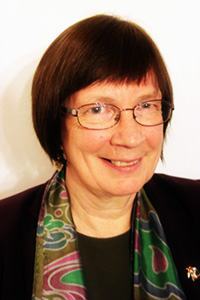Heli Bathija
Director of GFMER Knowledge Management and Sharing

Dr Heli Bathija, MD, Diploma of Tropical Medicine and Hygiene
22 June 1952 – 26 September 2019
The GFMER team says thank you and good-bye to our dear colleague and friend Heli who sadly passed away on 26 September 2019 and has been laid to rest.
Heli was an active and tireless member of the Foundation and never wasted any opportunity to promote its activities. Since joining the Foundation, she has contributed in many ways to its progress. With her passion for knowledge sharing and the improvement of sexual and reproductive health outcomes across the globe, but especially in developing countries, she started the GFMER initiative on “mHealth for Sexual and Reproductive Health” and subsequently developed the Online training course Mobile Phones for Sexual and Reproductive Health "MHealth4SRH" in 2013. She created an awareness on Environment and Reproductive Health (ERH) and was instrumental to the collaboration with the Alexandria University towards a proposal to develop an online training course on Impact of Environmental Pollutants on Reproductive Health. Heli is much loved and will be missed by the entire team.
Short biodata of Dr Heli Bathija
Dr Heli Bathija completed her medical studies at the University of Turku, Finland and received a Diploma of Tropical Medicine and Hygiene from the School of Tropical Medicine, Liverpool University, UK. She has worked in hospitals and health centres in Finland, been a district medical officer in Senegal and been part of the breast cancer research team in the American Health Foundation in New York, USA.
From January 1986 to June 2012 Dr Bathija worked at the WHO Headquarters in the Special Programme of Research, Development and Research Training in Human Reproduction (HRP) in Geneva, Switzerland where she coordinated many multi-country research studies on reproductive health, involving about 50 countries, with topics covering the whole range of reproductive health issues from the safety of contraceptive use during breastfeeding to obstetric outcome of women with female genital mutilation.
As the Area Manager for the African and Eastern Mediterranean regions in the Department of Reproductive Health and Research her responsibilities related to research capacity strengthening as well as giving technical support on programme development in countries in the two regions. 2011 – 2012 she was also the Area Manager for the European Region. Dr Bathija has lectured and facilitated workshops on adolescent reproductive health, ethical issues in reproductive health as well as on gender and reproductive rights. She initiated in 2006 and continued to be in charge of a webcast lecture series in which experts from around the world present up-to-date information on reproductive health and research issues. Since 2010 she has initiated and promoted various mHealth projects. Since 2011 she was the coordinator of the WHO team in the EU-sponsored consortium “Africa Build”.
Dr Bathija’s involvement in WHO went beyond the science and country support: she has written scripts for shows and films, produced a photo exhibition on women and girls of Afghanistan and concerts for WHO staff, initiated and coordinated the WHO HOPE team to promote informal networking and discussions about issues dealing with family as well as 10 bus trips for WHO staff and families. In 2011 she developed a project “Omeed-e-kodak: Hope for the babies” for WHO volunteers to knit sweaters for newborn babies in Afghanistan. That project has by June 2012 expanded beyond WHO to several countries across the globe and is in July 2012 an innovative finalist for The “Saving Lives at Birth: the Grand Challenge for Development”.
Links
- African Coordination Centre for the Abandonment of Female Genital Mutilation/Cutting - Heli Bathija - GFMER picture of the week
- The Grand Saconnex Town Merit Awards 2015 - Heli Bathija - GFMER picture of the week
- Dr. Heli Bathija attending the COP21 in Paris, France - GFMER picture of the week
- Advisory group meeting for Development of a FGM Learning Package for Health Care Providers, WHO Headquarters in Geneva, Switzerland - Heli Bathija - GFMER picture of the week
- Colloque international "Les Soins Obstétricaux et Néonataux d'Urgence : vingt-ans après", Dakar, Senegal - Heli Bathija - GFMER picture of the week
- Meeting of GFMER members with Dr Mario Festin, Geneva, Switzerland - Heli Bathija - GFMER picture of the week